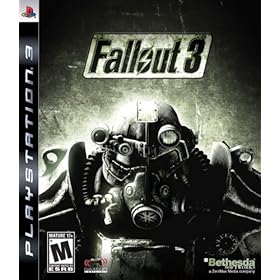
I haven't played any of the other Fallout games, but from what I can tell, Bethesda's first stab at the series takes the skill system and trademark sense of humor and transplants them effectively into Oblivion's engine. Coming out two and a half years later Fallout 3 isn't the big step forward I was hoping for, but it's still a great game when you play it. It still has some of Oblivion's glitches and awkward moments, but it does do a fair amount of things better. Characters look better, and there's way more variety in the voice actors. The speech and bartering system relies on numbers and chance instead of a conceptually moronic mini-game. There are little additions like an indicator if a container is empty so less time is spent searching for items. And they finally got the auto-leveling enemies thing right, in a best-of-both-worlds sort of scenario. The way it seems to work, wandering around outside will always produce enemies at a similar skill level to you, so it doesn't seem too easy. But once you've been to a specific location like an underground tunnel, the enemies will always stay at the level they were when you first went there, so going back for whatever reason lets you take care of them easily without having to worry about constantly getting beaten. It's a pretty good system, maybe the best that can be done with this sort of extremely non-linear game.
On that end, Fallout is in ways better and worse than the Elder Scrolls games. Doing only the side quests that naturally came my way while playing, I beat the main story in about 22 hours. I don't think that's much less than Oblivion, and Fallout's story is certainly more interesting. They really did a lot with the humor, making it a bit more enjoyable to just be in the world, and it has a number of quests that are more creative than anything else I've seen them do. Tranquility Lane springs instantly to mind. And there's a bit more freedom in proceeding through it, with multiple ways to complete certain objectives and a lot of options in the dialogue that make it replayable. But the whole world around the main quest is a bit more barren, and that's the part of Oblivion I liked the most. I know there's a number of significant things I haven't done yet, but it seemed like fun diversions just weren't as easy to stumble across. Only the Wasteland Survival Guide came close to having the depth of one of the Elder Scrolls' factions, and it's not even just the quests - wandering around a deserted wasteland and ramshackle towns built on destroyed pieces of the old civilization is a bit more depressing and purposefully empty than an intact fantasy empire. Fallout 3 is designed to be more focused and narrow than Oblivion, and I liked that game for its breadth.
Not that Fallout isn't very good at what it does. There was some concern about the combat system, but I think it works pretty well. The V.A.T.S. system to target specific weakpoints is useful, although I tended to go for the head pretty exclusively. The normal aiming isn't very good for a shooter, but it's functional enough that you don't feel helpless when you can't use V.A.T.S. and it can actually be satisfying to use it by itself. I didn't try too much melee combat, but it seemed to function a lot like Oblivion's without any blocking. The karma system seems a little deeper than the average good-or-evil gimmick more and more games seem to be having, and unlike most of the others, it actually gives a compelling reason to be neutral. The writing is better than some of their earlier work, and overall it's a bit more polished as a product. I've been comparing the game to Oblivion for the entire review, but in the end it's probably worth checking out if you're interested, even if you've never touched an Elder Scrolls game.
AAAAAGGGHHHH
16 years ago


































No comments:
Post a Comment